Aluminium Applications in Modern Industry and Architecture
Discover the diverse applications of aluminium in construction, architecture, and industry. Learn how its unique properties make it a sustainable and versatile material.

Aluminium applications have become a cornerstone of modern industry and architecture, thanks to the material’s unique combination of lightness, strength, and versatility. From large-scale construction to precision-engineered components, aluminium is shaping the way we design and build in the 21st century. Its adaptability allows it to meet the functional and aesthetic demands of a wide range of sectors.
Key Properties That Drive Aluminium’s Popularity
Aluminium is naturally resistant to corrosion, which makes it ideal for outdoor use and long-term applications. Its low density reduces structural loads, making it easier to transport and install without compromising durability. Additionally, aluminium can be fully recycled without losing quality, making it one of the most sustainable materials available. These qualities have positioned aluminium as a preferred choice for industries seeking both performance and environmental responsibility, as explored in The Versatile Aluminium: Properties and Diverse Applications.
Architectural and Structural Uses
In architecture, aluminium plays a critical role in creating structures that are both functional and visually appealing. It is used in façades, window frames, shading systems, and load-bearing elements, providing architects with flexibility in design while ensuring long-term performance. In our own production, aluminium profiles are commonly applied in pergolas, winter gardens, and windbreak systems, where their durability and precision manufacturing ensure reliable results.
Applications in Climate and Environmental Control
Aluminium’s performance characteristics make it a strong choice for systems designed to manage environmental conditions. In shading structures such as pergolas, it offers weather resistance and minimal maintenance needs. Winter gardens benefit from aluminium’s strength combined with advanced insulation technologies, creating comfortable spaces throughout the year. Windbreak systems, meanwhile, rely on aluminium’s ability to maintain form and stability even under constant exposure to the elements.
Industrial and Transportation Sectors
Beyond construction, aluminium is indispensable in transportation, including automotive, aerospace, and marine industries. Its high strength-to-weight ratio improves fuel efficiency and performance while maintaining safety standards. In industrial manufacturing, aluminium is used in machinery, equipment housings, and precision components. For a global perspective on its role in production and supply, see Aluminium Reserves, Global Production and Uses.
Aluminium Production in Turkey
Turkey has emerged as a significant producer of aluminium profiles, supplying both domestic and international markets. As outlined in Turkey’s Aluminium Profile Manufacturer, the country’s advanced manufacturing facilities and skilled workforce have helped it gain a competitive edge. Continuous investment in technology and quality control ensures that aluminium products meet the demands of diverse sectors worldwide.
From architectural design to high-performance industrial applications, aluminium continues to prove its value as a material that meets the needs of modern projects. Its unique properties ensure that it will remain a key player in sustainable, efficient, and innovative solutions for decades to come.

